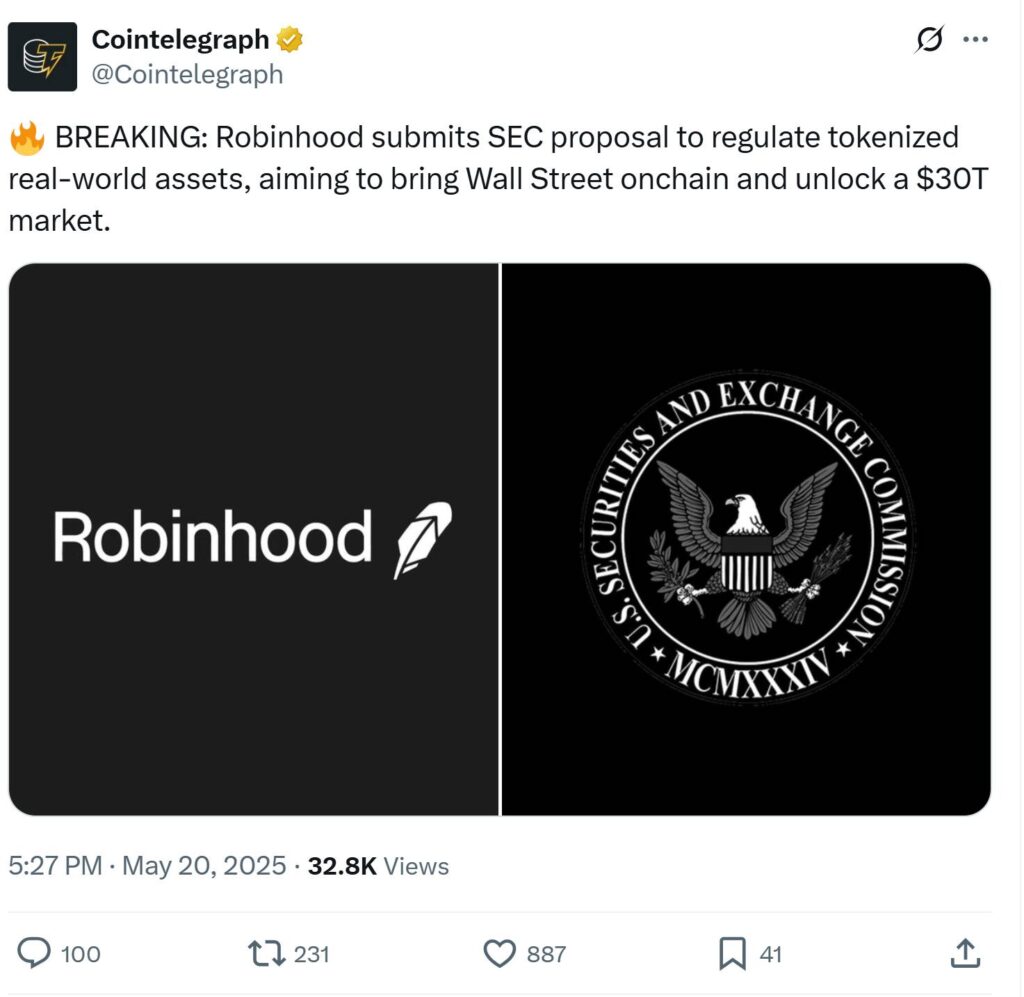In a significant move within the cryptocurrency landscape, Robinhood has submitted a 42-page proposal to the U.S. Securities and Exchange Commission (SEC), advocating for a comprehensive national framework aimed at regulating tokenized real-world assets (RWAs). This proposal seeks to modernize financial systems by ensuring that tokenized assets are regarded as legally equivalent to their traditional counterparts, thus facilitating compliant on-chain settlement. This development highlights Robinhood’s commitment to enhancing financial infrastructure, as reported by Forbes.
At the core of Robinhood’s initiative is the vision to establish the Real World Asset Exchange (RRE), a trading platform designed to offer off-chain trade matching alongside on-chain settlement, promising increased efficiency and transparency. The platform aims to standardize federal regulations to replace the currently convoluted maze of state-level securities rules that govern asset trading.
Moreover, Robinhood emphasizes the importance of compliance with Know Your Customer (KYC) and Anti-Money Laundering (AML) regulations. They plan to incorporate these protocols through partnerships with firms like Jumio and Chainalysis, ensuring adherence to global regulatory frameworks.
A crucial aspect of the proposal involves what Robinhood refers to as ‘token-asset equivalence.’ This concept signifies that a digital token representing a physical asset, such as a U.S. Treasury bond, would be treated the same as the bond itself. This change could revolutionize how institutions and broker-dealers manage tokenized RWAs, leading to smoother custody, trading, and settlement processes.
“RWA tokenization represents a new paradigm for institutional asset allocation. Robinhood is committed to leading this trend under a compliant framework,” said Robinhood CEO Vlad Tenev.
The RRE is projected to utilize a dual-chain architecture featuring Solana and Base, designed for high-frequency off-chain trade matching and rapid on-chain settlement. This innovative system is expected to significantly reduce the standard U.S. capital markets settlement time from T+2 days to T+0, potentially lowering trading costs by approximately 30% annually.
Robinhood’s proposal arrives at a time when interest in RWA tokenization is surging, as key figures from both traditional finance and the cryptocurrency sphere make strides in this space. Notable recent developments include BlackRock’s application to create a blockchain-based share class for its $150 billion Treasury Trust Fund and Libre’s initiative to tokenize $500 million in Telegram debt. Furthermore, MultiBank Group has just sealed a $3 billion tokenization agreement with a UAE real estate firm and a blockchain provider.
As the landscape evolves, industry experts suggest that clearer regulations and advanced technologies are paving the way for significant shifts in asset management strategies. Eric Piscini, CEO of Hashgraph, commented on this trend, highlighting the alignment of market needs with technological capabilities.
Robinhood’s Proposal for Tokenized Real-World Assets Regulation
Robinhood’s recent initiative to establish a regulatory framework for tokenized real-world assets (RWAs) could significantly impact how financial markets operate. Here are the key points to consider:
- 42-Page Proposal to SEC: Robinhood has submitted a detailed proposal aimed at regulating tokenized RWAs, indicating a move towards modernizing financial infrastructure.
- Creation of Real World Asset Exchange (RRE):
- RRE will provide a trading platform for offchain trade matching and onchain settlement.
- Expected to enhance efficiency and transparency in RWA trading.
- Federal Standards for Regulation: Robinhood advocates for uniform federal regulations to replace the current state-level securities regulations, potentially simplifying compliance for users.
- Integration of KYC and AML Tools:
- Partnerships with firms like Jumio and Chainalysis to ensure compliance with global standards.
- Direct impact on user trust and security in the financial ecosystem.
- Token-Asset Equivalence:
- Tokens representing RWAs would be treated as the assets themselves, facilitating their integration into existing regulatory frameworks.
- This could streamline trading processes and custody operations for institutions.
- Technological Advancements:
- RRE will utilize a dual-chain architecture with Solana and Base for efficient trade matching and settlement.
- Projected capabilities include matching latency below 10 microseconds and up to 30,000 transactions per second.
- Reduction in Settlement Times:
- Potential to reduce standard settlement time from T+2 to T+0, significantly lowering trading costs by 30% annually.
- This change may lead to enhanced liquidity and faster capital allocation in the market.
- Growing Interest in RWA Tokenization: The proposal aligns with a broader trend of major financial entities exploring RWA tokenization, indicating a pivotal shift in asset management and investment structures.
“RWA tokenization represents a new paradigm for institutional asset allocation. Robinhood is committed to leading this trend under a compliant framework.” – Vlad Tenev, CEO of Robinhood
Robinhood’s Ambitious Push for Tokenized Asset Regulation: A Game Changer or a Complex Challenge?
Robinhood’s latest initiative to propose a national framework for tokenized real-world assets (RWAs) has thrown the spotlight on the burgeoning field of asset tokenization. By seeking to establish a legal equivalence between tokenized assets and their traditional counterparts, Robinhood is positioning itself as a pioneer in modernizing financial infrastructure. This proposal, however, comes at a time of heightened interest and competitive dynamics in the tokenization sphere, with notable actions from institutional heavyweights such as BlackRock and MultiBank Group making headlines.
Competitive Advantages: Robinhood’s proposal aligns with a growing trend toward regulatory clarity, which is likely to attract both institutional and retail investors looking for secure avenues for their investments. The anticipated efficiency of compressed settlement times – potentially reducing standard trading processes from T+2 to T+0 – could significantly lower trading costs. This increased speed and reduced friction in transactions would be attractive to not just retail investors but also large institutions keen on optimizing their trading strategies.
Moreover, the integration of robust compliance measures, such as KYC and AML procedures through established partners, suggests a commitment to security and trustworthiness. This could foster a safe trading environment, making Robinhood’s platform particularly appealing in a sector often marred by regulatory concerns.
Competitive Disadvantages: Despite these advantages, Robinhood faces significant challenges in gaining traction. The push for uniform federal standards may encounter resistance from states that currently operate under diverse and distinct regulations. Furthermore, while Robinhood’s desire for immediacy in trading aligns with market demands, the technical execution of such a complex dual-chain architecture could lead to unforeseen operational hurdles—especially if user education and platform usability do not keep pace with the technological advancements.
The participation of larger financial entities in the tokenization market also presents challenges. With firms like BlackRock actively seeking to tokenize vast sums of investment, the competitive landscape is becoming crowded, potentially diluting Robinhood’s market share. This heightened competition may create difficulties for Robinhood to distinguish its platform and offerings amidst an array of alternative options vying for the same investor interest.
Who Stands to Benefit or Suffer? The implications of Robinhood’s proposal could greatly benefit both institutional investors and fintech enthusiasts who are eager for a compliant trading environment. As regulatory frameworks evolve to incorporate tokenization, institutions such as banks and investment firms could streamline operations and embrace digital assets more fully. Conversely, smaller brokerage firms and crypto platforms that lack the technological infrastructure or compliance capabilities may struggle to compete, positioning Robinhood as a significant force in establishing market leadership. Additionally, any regulatory roadblocks or pushback from state authorities could pose challenges to Robinhood’s ambitions, potentially stunting its growth within this critical sector.
















